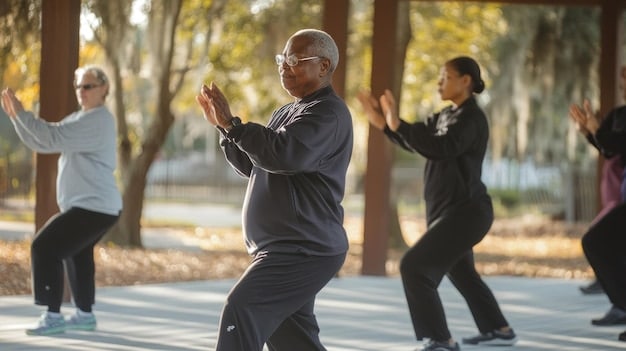Mindful Movement: Yoga & Tai Chi for Mental & Physical Health

Mindful movement, particularly through practices like Yoga and Tai Chi, offers a holistic approach to enhancing both physical and mental well-being by promoting body awareness, reducing stress, and improving overall quality of life through gentle, intentional movements and focused breathing.
Embark on a journey of self-discovery and wellness through mindful movement. Discover how Yoga and Tai Chi can transform your physical and mental health, promoting balance, reducing stress, and enhancing your overall sense of well-being.
Unveiling the Essence of Mindful Movement
Mindful movement is more than just exercise; it’s a practice that connects your mind and body through purposeful actions. It encourages you to become fully present in your body, noticing sensations, thoughts, and emotions without judgment.
At its core, mindful movement is about fostering a deeper awareness of yourself. It’s a way to cultivate a sense of calm and focus amidst the chaos of daily life. When practiced regularly, it can lead to significant improvements in both physical and mental health.

Yoga: A Harmonious Union of Mind and Body
Yoga, an ancient practice originating in India, integrates physical postures, breathing techniques, and meditation to create a holistic approach to health. It’s a powerful tool for cultivating mindfulness and promoting overall well-being.
Yoga’s benefits extend far beyond physical fitness. It can reduce stress, improve flexibility, and enhance your sense of inner peace. By focusing on your breath and body, you can quiet the mind and connect with your inner self.
The Physical Benefits of Yoga
Yoga offers a wide array of physical benefits that can enhance your overall health and vitality. Regular practice can improve flexibility, strength, and balance.
The Mental Benefits of Yoga
Yoga’s mental benefits are just as profound as its physical ones. It can reduce stress, anxiety, and depression, promoting a sense of calm and well-being.
- Reduces Stress: Yoga helps lower cortisol levels, the hormone associated with stress.
- Improves Mood: Yoga can increase levels of GABA, a neurotransmitter that promotes relaxation and improves mood.
- Enhances Focus: By focusing on your breath and body, yoga can quiet the mind and improve concentration.
Incorporating yoga into your daily routine can be a transformative experience. Whether you’re a beginner or an experienced practitioner, there’s a style of yoga that can meet your needs and help you achieve your wellness goals.
Tai Chi: The Art of Moving Meditation
Tai Chi, often described as “meditation in motion,” is a gentle and graceful martial art that originated in China. It involves a series of slow, flowing movements that promote relaxation, balance, and coordination.
Unlike many high-impact exercises, Tai Chi is gentle on the joints, making it an excellent option for people of all ages and fitness levels. It’s a practice that can be easily adapted to suit individual needs and abilities.
The Physical Benefits of Tai Chi
Tai Chi offers numerous physical benefits, including improved balance, coordination, and muscle strength. It’s also a great way to enhance cardiovascular health and flexibility.
The Mental Benefits of Tai Chi
The mental benefits of Tai Chi are just as significant as the physical ones. It can reduce stress, improve focus, and enhance your sense of inner peace.
- Reduces Stress: The slow, flowing movements of Tai Chi promote relaxation and reduce stress hormones.
- Improves Cognitive Function: Tai Chi can enhance memory, attention, and other cognitive functions.
- Enhances Mood: Regular practice of Tai Chi can improve mood and reduce symptoms of depression and anxiety.

Tai Chi is a powerful practice that can improve both your physical and mental well-being. Its gentle movements and focus on mindfulness make it an accessible and enjoyable way to cultivate a sense of calm and balance in your life.
Integrating Yoga and Tai Chi into Your Daily Life
Incorporating Yoga and Tai Chi into your daily routine doesn’t have to be daunting. Start with small, manageable steps and gradually increase your practice as you become more comfortable.
Consistency is key when it comes to reaping the benefits of these practices. Even a few minutes of mindful movement each day can make a significant difference in your overall well-being.
Creating a Mindful Movement Routine
To create a sustainable mindful movement routine, start by setting realistic goals and finding a time and place where you can practice without distractions.
Tips for Beginners
If you’re new to Yoga or Tai Chi, it’s important to start slowly and listen to your body. Don’t push yourself too hard, and be patient with your progress.
Consider taking a class or working with a qualified instructor to learn proper techniques and ensure that you are practicing safely. There are also many online resources available that can guide you through basic poses and movements.
- Start Slowly: Begin with short sessions and gradually increase the duration as you become more comfortable.
- Listen to Your Body: Pay attention to your body’s signals and avoid pushing yourself too hard.
- Find a Qualified Instructor: Seek guidance from a qualified instructor to learn proper techniques and prevent injuries.
By integrating Yoga and Tai Chi into your daily life, you can cultivate a greater sense of mindfulness, reduce stress, and improve your overall physical and mental health. These practices offer a powerful pathway to self-discovery and well-being.
The Science Behind Mindful Movement
The benefits of mindful movement are not just anecdotal; they are supported by a growing body of scientific evidence. Studies have shown that practices like Yoga and Tai Chi can have a profound impact on both physical and mental health.
Researchers have found that mindful movement can reduce stress hormones, improve immune function, and enhance cognitive abilities. It’s a holistic approach to health that addresses the interconnectedness of mind and body.
The Impact on Stress Hormones
Mindful movement has been shown to lower cortisol levels, the primary stress hormone. This can lead to reduced anxiety, improved sleep, and a greater sense of calm.
The Impact on Brain Function
Studies have found that mindful movement can improve cognitive function, including memory, attention, and executive function. It can also increase gray matter in the brain, which is associated with improved cognitive performance.
- Reduces Cortisol Levels: Mindful movement helps regulate the body’s stress response, leading to lower cortisol levels.
- Increases Brain Volume: Studies have shown that mindful movement can increase gray matter in areas of the brain associated with memory and attention.
- Improves Neuroplasticity: Mindful movement can enhance the brain’s ability to adapt and change, promoting cognitive flexibility.
The scientific evidence supporting the benefits of mindful movement is compelling. By incorporating practices like Yoga and Tai Chi into your life, you can tap into the power of your mind-body connection to enhance your health and well-being.
Personal Stories: Transformations Through Mindful Movement
The transformative power of mindful movement is best illustrated through the stories of individuals who have experienced its benefits firsthand. These personal accounts offer inspiration and encouragement for those seeking to improve their own well-being.
From reducing chronic pain to overcoming anxiety and depression, the positive impact of Yoga and Tai Chi on people’s lives is undeniable. These stories serve as a testament to the power of the mind-body connection.
Overcoming Chronic Pain
Many individuals have found relief from chronic pain through the practice of Yoga and Tai Chi. These gentle movements can improve flexibility, reduce inflammation, and alleviate discomfort.
Managing Anxiety and Depression
Mindful movement can be a powerful tool for managing anxiety and depression. By focusing on the present moment and cultivating a sense of calm, individuals can reduce their symptoms and improve their overall mood.
- Reduced Pain Levels: Many individuals report a significant reduction in chronic pain after incorporating mindful movement into their routine.
- Improved Mental Health: Personal stories often highlight the positive impact of Yoga and Tai Chi on anxiety, depression, and overall mental well-being.
- Enhanced Quality of Life: Through mindful movement, individuals often experience a greater sense of well-being, resilience, and overall quality of life.
These personal stories demonstrate the profound impact that mindful movement can have on people’s lives. By embracing practices like Yoga and Tai Chi, you can unlock your own potential for healing, growth, and well-being.
Sustaining Your Mindful Movement Practice
Sustaining a mindful movement practice requires commitment, patience, and self-compassion. It’s important to remember that progress is not always linear, and there will be days when you feel less motivated.
However, by setting realistic goals, finding a supportive community, and celebrating your successes, you can create a sustainable practice that enriches your life for years to come.
Setting Realistic Goals
Start with small, achievable goals and gradually increase your practice as you become more comfortable. Avoid setting unrealistic expectations that can lead to discouragement.
Finding a Supportive Community
Connecting with others who share your interest in mindful movement can provide valuable support, encouragement, and accountability. Consider joining a class, workshop, or online community.
- Consistency is Key: Aim for regular practice, even if it’s just for a few minutes each day.
- Be Patient with Yourself: Progress takes time, and it’s important to be kind and patient with yourself along the way.
- Celebrate Your Successes: Acknowledge and celebrate your accomplishments, no matter how small they may seem.
By following these tips, you can create a sustainable mindful movement practice that enhances your physical, mental, and emotional well-being. Embrace the journey with an open heart and a willingness to learn and grow.
| Key Point | Brief Description |
|---|---|
| 🧘♀️ Yoga Benefits | Enhances flexibility, strength, reduces stress, and improves mental clarity. |
| 🌿 Tai Chi Benefits | Improves balance, coordination, reduces stress, promotes relaxation. |
| 🧠 Mindful Movement & Brain | Enhances cognitive function, reduces stress hormones, increases brain volume. |
| 🌟 Personal Stories | Demonstrates how mindful movement can overcome chronic pain and improve mental health. |
FAQ
▼
Mindful movement involves intentionally focusing on the physical sensations and mental state during exercise, fostering a deeper connection between mind and body.
▼
Yoga reduces stress hormones like cortisol, increases neurotransmitters like GABA, and promotes relaxation, which collectively enhance mental well-being by calming the mind.
▼
Tai Chi enhances balance, coordination, and muscle strength, while also improving cardiovascular health and flexibility through its slow, flowing movements that are gentle on the joints.
▼
Yes, mindful movement is generally suitable for all ages and fitness levels. Practices like Yoga and Tai Chi can be adapted to accommodate individual needs and abilities easily.
▼
Aim for at least 15-30 minutes of mindful movement most days of the week. Consistency is key, but even short sessions can yield significant benefits over time.
Conclusion
Mindful movement, through practices like Yoga and Tai Chi, offers a holistic path to enhanced physical and mental well-being. By integrating these practices into your daily life, you can cultivate balance, reduce stress, and unlock your full potential for a healthier, more fulfilling life.





